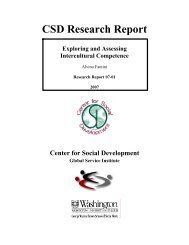Rediscovering social investment in developmental welfare state ...
Rediscovering social investment in developmental welfare state ...
Rediscovering social investment in developmental welfare state ...
You also want an ePaper? Increase the reach of your titles
YUMPU automatically turns print PDFs into web optimized ePapers that Google loves.
R E D I S C O V E R I N G S O C I A L I N V E S T M E N T I N D E V E L O P M E N T A L W E L F A R E S T A T E P O L I C I E S :<br />
B A C K T O T H E F U T U R E<br />
I can only very briefly summarize the history, evolution, and extensions of <strong>social</strong> development<br />
before discuss<strong>in</strong>g its limitations vis-à-vis exist<strong>in</strong>g <strong>social</strong> policy and the need for a theoretical synthesis<br />
(see Johnson, 2010, for detailed discussion). Social development emerged <strong>in</strong> the Global South<br />
around colonialism. 22 Under Gunnar Myrdal, the UN Economic and Social Council articulated the<br />
first and only <strong>in</strong>ternational <strong>state</strong>ment of pr<strong>in</strong>ciples of <strong>social</strong> policy underly<strong>in</strong>g what came to be<br />
known as the <strong>in</strong>clusive strand of <strong>welfare</strong> <strong>developmental</strong>ism <strong>in</strong> 1971. It reflected, for the first time, a<br />
unified socioeconomic approach to plann<strong>in</strong>g <strong>in</strong> develop<strong>in</strong>g countries, which transcended the narrow<br />
focus on economic growth <strong>in</strong> favor of <strong>in</strong>tegrat<strong>in</strong>g economic and <strong>social</strong> plann<strong>in</strong>g. Midgley suggests<br />
that this conception was explicitly based on a <strong>state</strong>-directed development process and was<br />
compatible with the ideals of modernization that prevailed <strong>in</strong> development th<strong>in</strong>k<strong>in</strong>g at the time. This<br />
criticism of the tendency <strong>in</strong> economics to draw a dist<strong>in</strong>ct l<strong>in</strong>e between economic and <strong>social</strong><br />
phenomena, separat<strong>in</strong>g <strong>social</strong> development from economic development, was groundbreak<strong>in</strong>g.<br />
Unfortunately, it failed to have a substantial impact on policy <strong>in</strong> develop<strong>in</strong>g countries because of<br />
adverse macroeconomic conditions and the ascendancy of neoliberalism.<br />
While the renewed focus of UN activity <strong>in</strong> the <strong>social</strong> development area has been on translat<strong>in</strong>g<br />
lessons from developed countries to develop<strong>in</strong>g countries, the focus of <strong>social</strong> development writers<br />
(e.g., Midgley) has been on try<strong>in</strong>g to develop it <strong>in</strong>to a more comprehensive notion. 23 Specifically,<br />
Midgley (1995) attempts to synthesize a wide-rang<strong>in</strong>g development-related literature <strong>in</strong>to a universal<br />
model that can be applied at local, regional, and national levels <strong>in</strong> both <strong>in</strong>dustrialized and develop<strong>in</strong>g<br />
nations. Argu<strong>in</strong>g that <strong>welfare</strong> <strong>state</strong> policies have generally foundered <strong>in</strong> the Global South (Midgley,<br />
2003a) he advocates an approach that relies less on direct government services and transfer<br />
payments. Instead, Midgley argues for harmoniz<strong>in</strong>g <strong>in</strong>dividual enterprise, the market, community<br />
participation, and governmental activities, where the <strong>state</strong> would help guide the process through<br />
<strong><strong>in</strong>vestment</strong>s <strong>in</strong> education, health, job tra<strong>in</strong><strong>in</strong>g, and <strong>in</strong>frastructure.<br />
Importantly, the focus on pluralism and pragmatism reflected <strong>in</strong> Midgley‘s perspective contrasts with<br />
standard approaches <strong>in</strong> <strong>in</strong>dustrialized nations <strong>in</strong> which economic and <strong>social</strong> policy are largely<br />
bifurcated and is a response to the neoliberals who argue that nearly all types of <strong>state</strong> <strong>in</strong>tervention<br />
will lead to economic failures. However, this perspective uncritically, if implicitly, accepts<br />
economists‘ characterization of exist<strong>in</strong>g <strong>social</strong> policy as largely unproductive. Both UN and academic<br />
contributions have focused on develop<strong>in</strong>g countries and the problems of underdevelopment and<br />
widespread poverty (Midgley, 1997) rather than understand<strong>in</strong>g whether and how current <strong>social</strong><br />
policies <strong>in</strong> Western nations serve to foster economic development. 24 In order to be useful <strong>in</strong> help<strong>in</strong>g<br />
reconcile the economic and <strong>social</strong> is not equivalent to contend<strong>in</strong>g that some exist<strong>in</strong>g policies reconcile the two because<br />
at some fundamental level they cannot be fully separated.<br />
22 As Midgley and Tang (2001, p. 244) note, ―events <strong>in</strong> Europe provided an <strong>in</strong>tellectual framework for <strong>developmental</strong><br />
<strong>welfare</strong>.‖ However, ―it was <strong>in</strong> the British colonial territories that <strong>social</strong> development ideas were first translated <strong>in</strong>to<br />
practical programmes.‖ While ―its ideational roots <strong>in</strong> the west are well-known‖ (Midgley, 1995, p. 62), its applicability to<br />
the West is only now beg<strong>in</strong>n<strong>in</strong>g to be reconstructed (see Mkandawire, 2006a for further discussion). Very little is known<br />
about its expression <strong>in</strong> western <strong>social</strong> policy, and develop<strong>in</strong>g this idea was a central task of the dissertation.<br />
23 The UN has renewed its focus on <strong>welfare</strong> <strong>developmental</strong>ism through the UN Development Programme‘s (UNDP)<br />
issuance of its first (1990) and subsequent Human Development Reports (1995, 1996), the Copenhagen World Summit<br />
on Social Development (1995), and the UN Research Institute for Social Development (UNRISD) project of Social<br />
Policy <strong>in</strong> a Development Context (2000, 2005). These <strong>in</strong>itiatives have helped to reemphasize <strong>social</strong> development policies<br />
<strong>in</strong> develop<strong>in</strong>g nations and to reestablish the prom<strong>in</strong>ence of <strong>social</strong> development ideas among the developed nations.<br />
24 This has constra<strong>in</strong>ed its perceived relevance to the Third or develop<strong>in</strong>g world context and has impeded its application<br />
to understand<strong>in</strong>g the role of <strong>social</strong> policy <strong>in</strong> promot<strong>in</strong>g economic development <strong>in</strong> the developed world. I argue that the<br />
C E N T E R F O R S O C I A L D E V E L O P M E N T<br />
W A S H I N G T O N U N I V E R S I T Y I N S T . L O U I S<br />
16
















